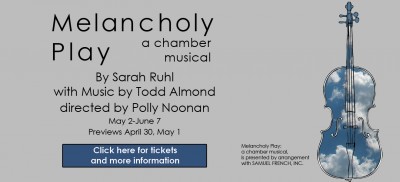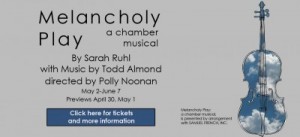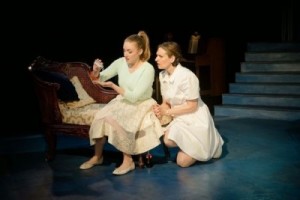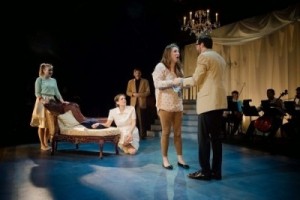
[rating=4]
 Sarah Ruhl’s “Melancholy Play: a chamber musical” with music by Todd Almond is billed, at least by the characters, as a defense of Melancholy, but the feeling one gets from The Piven Theatre’s production is that of overwhelming nostalgia for an old world. As though the two concepts, nostalgia and melancholy, are inextricably linked, and that there is something contemporary America has lost that allows people to experience true is melancholy with all its beauty, tragedy, and melodious pain. Aside from the deliberately antiquated set (Jacob Watson), props (Austin Kopsa), and costumes (Stephanie Cluggish), this was accomplished by Ruhl’s script, Todd Almond’s chamber music, Polly Noonan’s direction, the actor’s conservative performances and each character’s carefully cultivated traditional persona. Unfortunately, the story takes rather a detour for the Kafkesque in the second act when Tilly recovers, and other characters begin turning into almonds with no other explanation than having caught her melancholy. It feels a bit too comic and grotesque to coincide with the rest of Ruhl’s script and Almond’s score, and makes considerably less sense than it would in Kafka, but it can’t seriously mar the experience of an equity performance with live chamber music.
Sarah Ruhl’s “Melancholy Play: a chamber musical” with music by Todd Almond is billed, at least by the characters, as a defense of Melancholy, but the feeling one gets from The Piven Theatre’s production is that of overwhelming nostalgia for an old world. As though the two concepts, nostalgia and melancholy, are inextricably linked, and that there is something contemporary America has lost that allows people to experience true is melancholy with all its beauty, tragedy, and melodious pain. Aside from the deliberately antiquated set (Jacob Watson), props (Austin Kopsa), and costumes (Stephanie Cluggish), this was accomplished by Ruhl’s script, Todd Almond’s chamber music, Polly Noonan’s direction, the actor’s conservative performances and each character’s carefully cultivated traditional persona. Unfortunately, the story takes rather a detour for the Kafkesque in the second act when Tilly recovers, and other characters begin turning into almonds with no other explanation than having caught her melancholy. It feels a bit too comic and grotesque to coincide with the rest of Ruhl’s script and Almond’s score, and makes considerably less sense than it would in Kafka, but it can’t seriously mar the experience of an equity performance with live chamber music.
After Frank (Chris Ballou) sings the prologue to the play, describing it as a defense of melancholy and identifying primal things like, stars, love, death, the sea, and times of the day as its various causes (this will be a theme of the musical score throughout the play), Tilly (Stephanie Stockstill), a bank teller, goes to visit him, and they fall in love. Her psychiatrist Lorenzo (Ryan Lanning), hair-dresser Frances (Lauren Paris), and the hair dresser’s lover Joan (Emily Grayson) also fall in love with her, all for the same reason: she is melancholic. Bank-tellers, tailors, and hairdressers are people to whom one goes, or people to whom one used to go before they became mechanized, franchised, or prepackaged, and to engage in a quasi-personal relationship with each: the keeping of one’s money, cutting of one’s hair, and fitting of one’s clothes are terribly intimate acts after all. Tilly quickly recognizes that Frank is one of her clients because he comes in every day, withdraws the same amount, and turns left as he leaves, neglecting the convenience of the machine outside the bank. Frances was a physicist but apparently found the work unfulfilling, and instead decided on a career interacting with another woman and listening (and keeping) to their secrets as she cuts their hair. Frances’ lover Joan, and Tilly’s doctor, Lorenzo, may belong to the, as-of-yet un-mechanized medical profession, but it’s worth noting that Joan has an English accent and Lorenzo one from “an unspecified European country.” By the end of the play, it will turn out that many of the characters are unwilling immigrants from unspecified European countries, and that they’ve all been abandoned by a continental parent.
The chamber music, of-course, makes the piece, and the nostalgia. It is beautiful and sad in the way that only live chamber music can be, and the actor’s are very adept at singing the score in a conservative, traditional, and old-world way. Each actor gives a very credible performance, but I thought that Ballou and Stockstill stood out as cultivating more authentically bygone personas than the other actors in the ensemble: I was in love with their melancholic characters by the end of the play although it should be noted that I am particularly prone to that type of nostalgia. Others might find Ryan Lanning’s performance the most noteworthy. He provided a very considerable amount of much needed, before the second act anyhow, comic relief as the psychiatrist Lorenzo. In fact, with him involved, there was really no reason for people to turn into almonds, he more made the whole experience comic and digestible, even through all that melancholy, and his is a performance that everyone will undoubtedly cherish and remember long after the play. The lighting (Rachel Levy) gave the sense of a charming, dreary, old-world town, not sure how many of those there are in Illinois (where the play is set), but I think going for congruity with the character’s personas and the script’s ambience was the right choice.
Sarah Ruhl’s “Melancholy Play: a chamber musical” is running at the Piven Theatre in Evanston which is located at 927 Noyes Street through June 21st. It plays Thursdays through Saturdays at 7:30 and Sundays at 2:30. There will be talk-backs with playwright Sarah Ruhl on Thursday June 18, and Sunday June 21st where she will be joined by the cast. Tickets are $20-35 dollars and are available by calling 847-866-8049 or at the www.piventheatre.org
There is plenty of parking. some metered, some not and the train station (purple line) is just down the street. To see what others are saying, visit www.theatreinchicago.com, got to Review Round-up and click at “Melancholy Play” a Chamber Musical”.







More Stories
“Adverses”
“Blue” reviewed by Jacob Davis
“The Secret Garden”